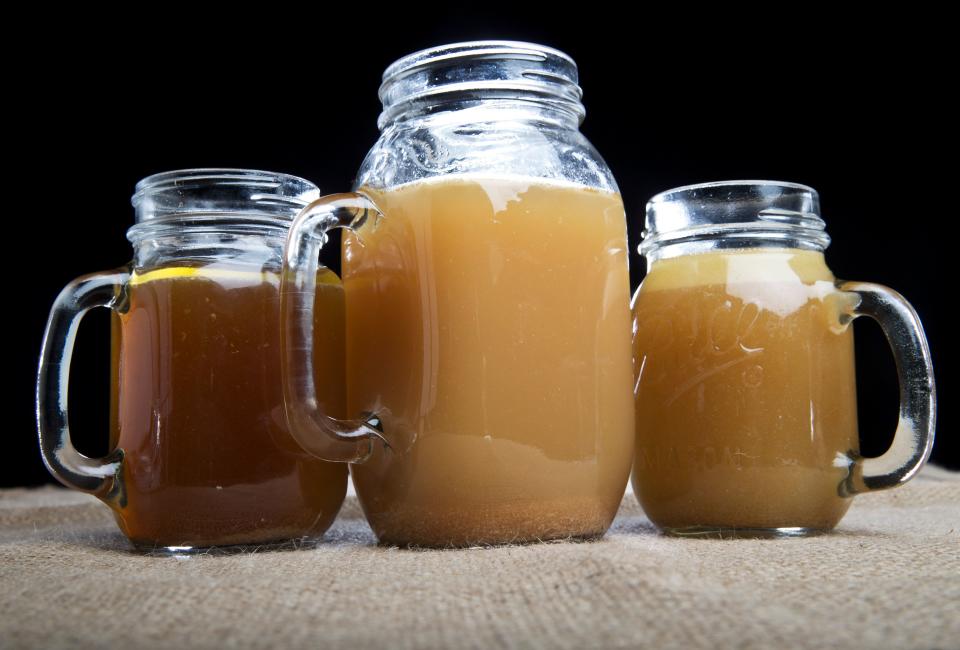What's The Best Form Of Collagen: Beauty Products Or Supplements?

There’s a great quest for collagen happening these days — at beauty counters, health food stores and in dermatologist offices. But why is this protein so important, and is it possible for us to slather, sip or chew our way into more collagen-rich skin? Dermatologists gave us the facts.
First, it may help to know what collagen is. “It’s the protein that’s found in the highest abundance in the human body,” dermatologistCorey L. Hartman told HuffPost. “It’s often referred to as the glue that holds everything in our body together.”
While we might know it as a building block for skin, Hartman said collagen also is important for muscle, tendons, ligaments, bones, blood vessels, eyes and teeth.
That “glue,” though, ends up being in shorter supply as we age. “Especially after the age of 30, collagen production naturally slows down,” dermatologist Joshua Zeichner, an associate professor of dermatology at Mount Sinai Hospital, said.
And it’s not just time that eats away at our collagen reserves — it’s also our lifestyle. “Exposure to UV light causes free radical damage, which harms collagen, weakens the skin and leads to wrinkling,” Zeichner said. “High blood sugar levels lead to a process known as glycation, in which sugar molecules attach to collagen, causing it to stiffen and crack.”
The challenge of topicals: little pores, big molecules
Once we stop producing so much collagen, the race is on for ways to replace it, whether through creams that contain it or supplements of it in powdered form.
First, let’s talk topicals. Experts say collagen-rich creams definitely can improve appearance, but they’re not able to break through the skin barrier and start building up new reserves. DermatologistArianne Shadi Kourosh, an assistant professor at Harvard Medical School, explained: “Our skin barrier only allows very small molecules to be absorbed, but the collagen molecule is over 100 times too large.”
“There is little evidence to support a collagen-containing cosmetic cream’s ability to increase collagen in the deeper layers of the skin,” dermatologistBrandon Kirsch said.
Zeichner noted that collagen cremes “certainly can improve the appearance of the skin, but this is through its moisturizing abilities, rather than any anti-aging effects.”
Still, research continues. “There are a few promising studies on topical collagen use that show a positive benefit on skin’s firmness and elasticity,” Hartman said.
But that’s not to say that collagen as a topical ingredient can’t make a difference in skin’s appearance, such as through the diminishment of fine lines and wrinkles. Just don’t believe claims that it can change your body’s production of the protein.
“Collagen cream can help keep your skin hydrated, which will lead to a smoother and plumper appearance of your skin, along with greater elasticity,” said dermatologistJeannette Graf, assistant clinical professor of dermatology at Mount Sinai School of Medicine. She offered this suggestion for a simple “two-fer” trick: “When using a collagen cream, make sure to use a product that has vitamin C as well. You can see better anti-aging results with this combination.”
What about supplements?
Now that we’ve figured out how the topical form of this protein works, what about its effect on the body when it’s digested in supplement form?
The news there is more positive, with new research changing the landscape. “Early thinking about supplements was not promising,” Hartman said. “But there have been new developments, and emerging research supports a role for collagen supplements in promoting improved skin texture and tone.”
“Numerous human studies have shown that the oral intake of collagen may boost skin collagen production and provide anti-aging effects,” Kirsch said.
How does that happen? “When collagen is ingested, it’s broken down by the stomach and intestines into fragments made of amino acids,” Zeichner explained. “These collagen-breakdown products then travel throughout the bloodstream and can reach the skin. There are theories that the fragments act like a trigger to skin cells, telling them to increase collagen production by making them think that natural collagen has been broken down.”
How to shop for collagen supplements
There are plenty of ways to get more collagen into your diet by eating more eggs, fish and bone broth. If you want to start taking collagen supplements, be sure to do some careful label reading. “Some supplements contain hydrolyzed collagen, which is essentially pre-digested, so there’s not the same degree of breakdown in the gut,” Zeichner said. “Many experts believe that these solubilized collagen supplements are more effective options.”
If you avoid eating animal products, collagen supplements probably are not for you. “Vegan collagen does not exist,” Kourosh said. “The molecule comes from the tissues of animals, so collagen products that say they’re ‘plant-based’ may contain amino acids that are building blocks of collagen, with the idea that the body can use those to make collagen. But whether or to what extent this can happen in the body has not been proven or measured.”
But plants are important to support your collagen production, Kourosh added. “Some nutrients from plant sources like vitamin C help the collagen-building process,” she said. “It can be viewed like taking any other vitamin. Gradually, this improvement in our nutrition could improve the health and strength of our body and improve our appearance, although the impact may not be something we can measure and can be highly variable between different people.”
Below are some collagen products that meet with these dermatologists’ approval.
HuffPost may receive a share from purchases made via links on this page. Every item is independently selected by the HuffPost Shopping team. Prices and availability are subject to change.
This article originally appeared on HuffPost and has been updated.




